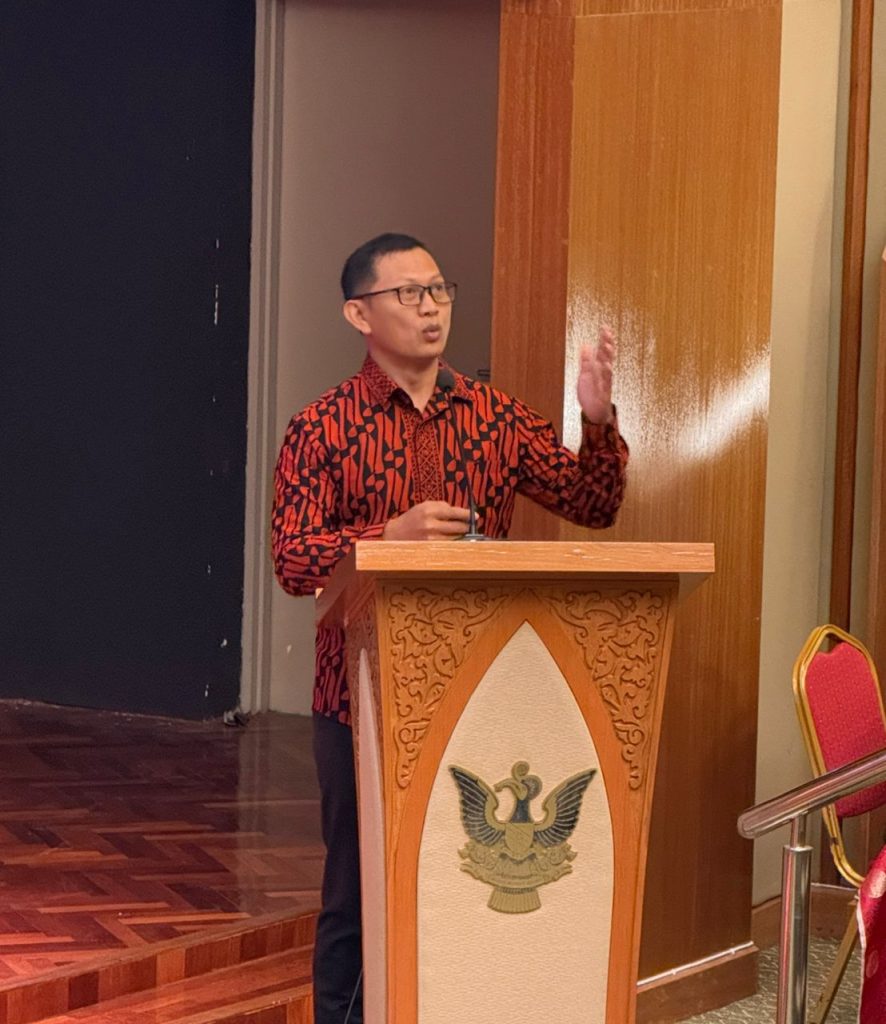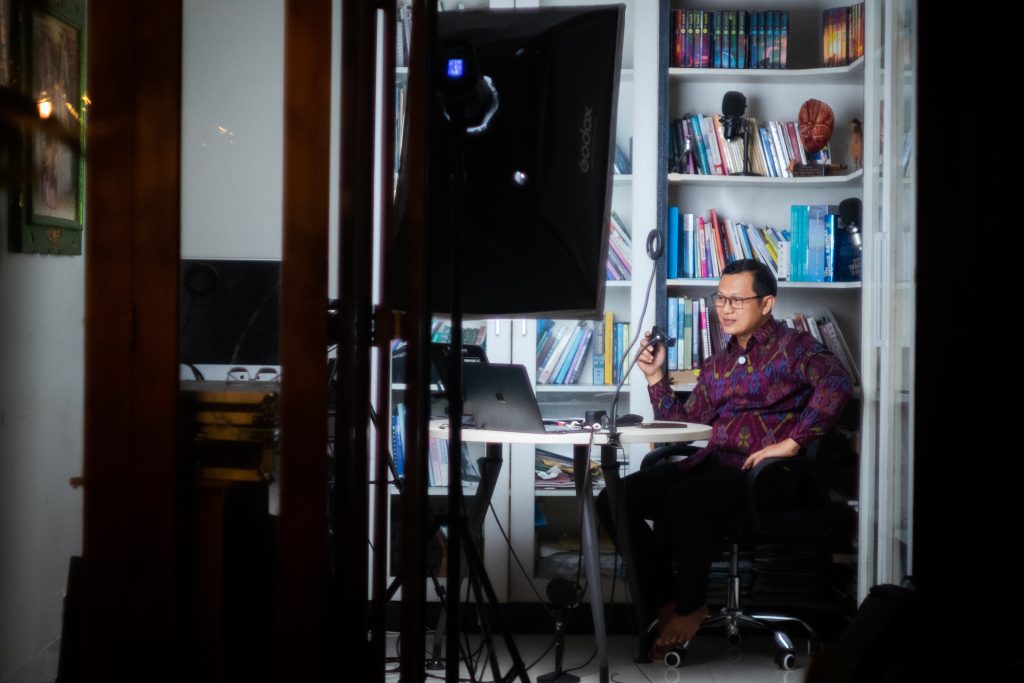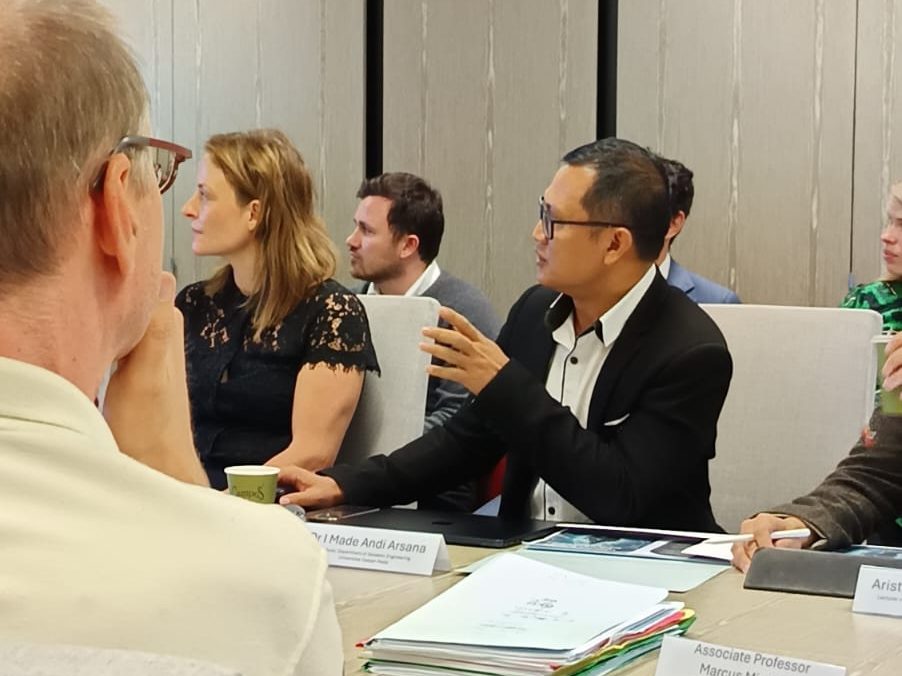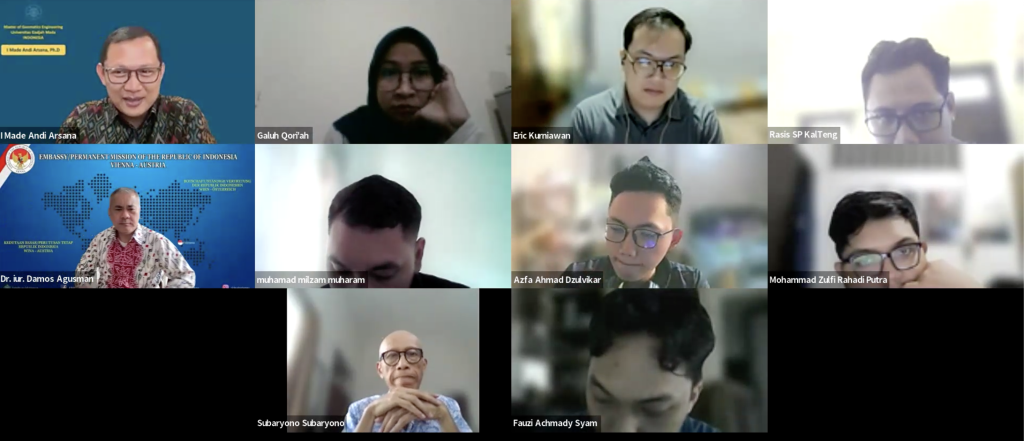Home » Articles posted by I Made Andi
Author Archives: I Made Andi
Understanding Indonesia–Malaysia Border Issues Through the Eyes of a Malaysian Scholar
On 26 May 2025, I had the pleasure of welcoming Associate Professor Hazmi Rusli as a guest lecturer in my Master’s course at the Geomatics Engineering Program, Universitas Gadjah Mada. A/P Hazmi delivered a lecture on the complex and often sensitive topic of Indonesia–Malaysia border issues. Though the session was held online, the impact was as strong as if it were in person. I invited him not only as a fellow academic but also as an old friend—I’ve known Hazmi since 2009, back when we were both graduate students at the University of Wollongong. For me, this lecture was more than an academic event; it was a beautiful example of how genuine friendship can evolve into meaningful professional collaboration.

The main audience of this session was my class on Border Management and Maritime Boundary Delimitation, a core course in the Master’s program. Over the past few weeks, we’ve explored theories and frameworks related to border governance. But theory needs grounding, and that’s precisely what A/P Hazmi provided—a real-world view from the Malaysian side of the border. His insights were not only timely but deeply relevant, offering students a richer, more nuanced understanding of what cross-border issues look like in practice.
(more…)Geospatial Sharing with Industry
Educational institutions, like universities, have strong interest for industries to flourish. Without strong industries, education will lose its purpose. How can one convince the society that someone should study in a particular major if relevant industries do not even well developed? Even worse, one will not be interested in studying a particular major if there is no relevant industries. Hence, educational institutions should do their best to support the development of industries.

That was the reason for me to share my geospatial knowledge to employees of PT. Madhava Persada in Yogyakarta. I understand, while the company focuses its services on geospatial field, some employees do not have adequate geospatial background. It is acceptable since each employee has their own role, which might not be directly related to geospatial matters.
I gave a one-hour lecture and the employees paid attention really well. I realize one thing that we, academicians, really need to share our knowledge. Something simple for academician might be that simple for practitioners. It can be an enlightenment. Similarly, academicians also need to listen from practitioners to enrich their understanding, especially to put their knowledge in practical contexts.
In short, academicians and practitioners need to collaborate. Educational institutions need to be hand in hand with industries to support each other.
Judging in the Sleman Beauty Pageant Competition
My childhood was far away from anything like beauty pageant competition. Even if it existed, it had nothing to do with my life. Beauty pageant competition was only something I heard about or accidentally watched on TV. Nothing more than that.
Hence, it came to me as a big surprise when I received an invitation as one of the judges in the Sleman Regency Beauty Pageant Competition. The competition is also known as Dimas Diajeng Sleman. It is something like Mr and Ms Sleman, the regency where I am currently residing.

I hesitated at first but the committee then managed to convince me that my participation is something positive and acceptable. I was asked to assess the level o understanding and familiarity of the candidates on international insight. I guess it was something that I could take part. Hence, I accepted the request.
(more…)Teaching in Kuching
Inside one of Sarawak’s most iconic buildings—the local Parliament in Borneo—I had the privilege of delivering a three-hour lecture on the geospatial and legal dimensions of maritime boundary delimitation. The audience comprised around 50 engaged participants from a diverse range of institutions: the Attorney General’s Chambers of Sarawak, Members of Parliament, the Ministry of Transportation, and other agencies. Their enthusiasm and sharp questions made the session especially rewarding.

The invitation came from Dr. Jady Hassim and Ms Vanessa Jawa, whom I first met in February this year at the National University of Singapore (NUS), when I gave a lecture on baselines and maritime boundaries. Apparently, they found that session valuable enough to bring the same discussions to a broader audience in Kuching. I was honoured.
(more…)Living in Jogja, Teaching in New York
Back in 2007, I taught my first online class from New York. It was around 1 or 2 in the morning—adjusted to match the afternoon class time in Jogja. I used Google Talk back then (what we now know as Google Meet). The students, class of 2004 of the Department of Geodetic Engineering, UGM, followed with great enthusiasm. Online classes were a novelty, back then.

SUPPORTING MUHAMMADIYAH
I was asked to assist the U.S. Embassy, through Education USA, in supporting the development of academic internationalization across Muhammadiyah universities in Indonesia. This program is funded by the U.S. government with the aim of preparing Muhammadiyah campuses to welcome American students. It is truly an honor to be part of this noble endeavor.
(more…)Speaking on Maritime Issues at ANU, Australia
I returned to Canberra after more than twenty years of my first visit to the quite city. I visited Canberra for the invitation from the Australian National University (ANU) to discuss our research findings on maritime issues, especially Indonesia’s maritime strategy. The research was a collaboration among six researchers from Indonesia and Australia. It was a sort, yet meaningful visit

In a forum taking place on 14 April 2025, a number of prominent scholars from ANU and Australian government officials were in a attendance. I shared my views on the development of Indonesia’s maritime strategy, especially maritime zones and boundaries. I presented how Indonesia’s maps have developed in depicting maritime spaces. The maps certainly are not only about spaces. They also portray Indonesia’s development on sovereignty and sovereign rights.
We had productive discussion during the event. Some prominent scholars also provided us with invaluable input that we can use to improve our research. I personally have learnt a lot from the discussion. Apart from the invaluable insights form the discussion, the visit to me was a personal journey. To be able to return to Australia and sharing knowledges that I started to learn in Australia, is indeed something. It felt good to be back, even though only for a short period of time.
Talking about the South China Sea in the South China Sea
I visited Haiko, Hainan, an island in the South China Sea China, on 26-29 March 2025 for a conference on the South China Sea. It was a sub-forum of the Boao Forum for Asia (BFA) where I gave a talk on the utilization of geospatial data to promote collaboration in environmental protection in the South China Sea. The invitation came from the National Institute of the South China Sea, in collaboration with other intuitions such as China Oceanic Development Foundation, Huayang Center for Maritime Cooperation and Ocean Governance, and Boao Forum for Asia Secretariat.
Learning Maritime Boundary Issues from An Established Diplomat
I’ve always believed that learning should begin with real-world practice, not just theory. That’s why I often invite practitioners to teach in my classes. This time, I had the honor of welcoming Ambassador Dr. Damos Agusman, Indonesia’s Ambassador to Austria in Vienna, to share his insights and experiences on maritime boundary delimitation.

An Ambassadorial Lecture by Dr. Bebeb Djunjunan from Athen
I have known Ambassador Djundjunan for almost ten years. Pak Bebeb, how I call him, is a senior diplomat from Indonesia. At the time of writing, He is the Ambassador Extraordinary and Plenipotentiary of the Republic of Indonesia to the Republic of Greece in Athen. On 10 March 2025, he was kind enough to teach in my two classes: Border Management, and Delimitation and Demarcation of Maritime Boundaries. It was such a privilege.

The communication was easy. Pak Bebeb is a kind and humble Ambassador to communicate with me via Whatsapp. When I texted him regarding my plan to invite him to my class, he said yes without any hesitation. I texted him on 27 February 2025 and 11 days later he was already in my online class. Pak Bebeb appeared in my class through a zoom meeting.
(more…)
Recent Comments